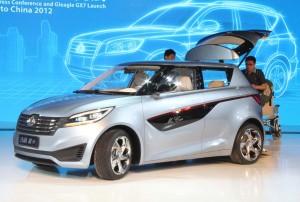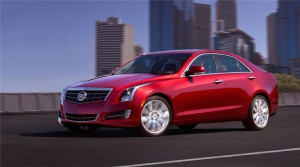
The Geely Gleagle is one of the products that makes Chinese government officials believe three Chinese automakers will be globally influential.
China’s fast-growing automobile industry should be able to create at three strong globally competitive carmakers in the years to come, according to a Chinese government official this week.
Wang Xia, a senior official with the China Council for the Promotion of International Trade Automotive sub-council, acknowledged during a press conference prior to the opening of the Global Automotive Forum in Wuhan, China, that China’s homegrown auto industry has been rocked over the last several months by a steady loss of marketshare.
Up until about two years ago, Chinese brands held about 46% of the domestic sales across China. Since then, the Chinese domestic brands have lost about 10 points of marketshare to foreign brands. The big winners have been European brands as well as General Motors and Ford.
Wang noted the pressure on the domestic brands has led to calls for government support for the domestic brands as well as other remedies. Some Western commentators have suggested the crackdown on suppliers linked to the foreign carmakers, such as Mercedes-Benz and Chrysler, has been fueled by the concern for the health and prospects for the domestic brands.

GM's sales in China are up 11.6% through September. Non-Chinese automakers have significantly cut the marketshare of native makers.
As the Chinese auto industry continues to grow, he expects as many as many as three global companies to emerge from the Chinese auto industry.
The auto industry, which he described as both a “pillar and an umbrella,” is critical to both the economy of China and the global economy as a whole.
Jack Perkowski, an American investor who has been involved in the Chinese auto industry for two decades, said at least two Chinese companies, Geely and Great Wall, were clearly front-runners in the race to become global companies.
Geely, which now owns Volvo, and Great Wall are not likely to export vehicles to Europe or North America for several years, he said. But they looking to expand into other emerging markets outside of China, he said.
“That’s probably the right strategy for them,” Perkowski.
Chinese companies closely allied with world’s leading automakers, such as Dongfeng, First Automotive Works and Shanghai Automotive Industry Council, are already in a class by themselves, he added.
(Chinese car sales slow. For more, Click Here.)
The growth of the Chinese auto industry in China has been one of the consequential developments in the world economy in decades. When he arrived in China 20 years ago, the country was building 500,000 vehicles annually. Most of those were trucks built specifically for commercial purposes. It now builds 22 million vehicles annually and the total continues to rise.
Perkowski noted sales of vehicles in China could reach 35 million units by 2020. China’s appetite for motor-driven transport is huge, he added.
(Click Here for details on GM and VW swapping global sales spots.)
“The build 60 million gasoline engines in China every year,” he noted. A huge slice of the engine production is used for inexpensive vehicles ranging from motorbikes to small farm vehicles and runabouts.
The demand for less expensive vehicles will probably help save a number of homegrown Chinese companies, Perkowski added.
(To see more about GM’s strong October sales results, Click Here.)
The growth of the GAF conference itself is a testament to growth and influence of the Chinese automobile industry. The two-day conference is expected to draw more than 1,000 visitors from 18 different countries and the list of speakers include senior executives from companies based in Europe and North America.
The list of speakers includes Matt Tsien, president of GM China, and Li Shufu, chairman and founder of the Geely Group and Qi Yumin, chairman of Brilliance Automotive Group.

Let’s not forget Chongqing Changan Auto and Wuling Auto.
Qi Yumin should be the the chairman of Brilliance Auto Group, not “chairman of China”
Thanks for the catch…corrected.
Paul E.